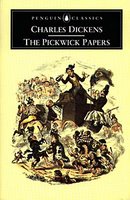
Charles Dickens, The Pickwick Papers
Last year, I decided I would attempt to read the entire Dickens canon in chronological order, leisurely working my way through all sixteen novels (this is going to take me a few years, obviously). Pickwick (Dickens's first novel) is one that I had read several years ago on a summer lark, but it was wonderful to reread this work and "revisit an old friend," as it were.
The "story" tells of Mr. Pickwick, founder of the Pickwick Club, and his entourage of fellow club members -- Mr. Winkle, Mr. Snodgrass, and Mr. Tupman, as well as that masterpiece of comic creation, Sam Weller -- as they participate in adventures and misadventures in and around the English countryside circa 1837.
In terms of Dickensia, this is where it all began: the quirky characters, the festive inns, the wry social commentary, the linguistic perambulations, and the tidily resolved plot and subplots. But one of the things that I absolutely love about this novel is the unabashed fun Dickens was obviously having as he wrote it! If ever there were a book in which you could imagine the author chuckling to himself because of the hilarity of the dialogue or description he'd just written, it is this one. And while there are many books I would count as the funniest I've read (The Catcher in the Rye, A Confederacy of Dunces, and Catch-22, for example), their humor is ultimately eclipsed by a dark and threatening world vision. The world of Pickwick, however, is one of childish delights; nothing bad will ever really befall any of the characters, and somehow we readers know this. Pickwick is innocent fun amid the inns, coach stands, and gaming fields of 19th Century England, and the reader is momentarily transported to an era in which we can all act foolishly amongst friends, and all will be forgiven over sweetmeats and libations!
In some ways, then, this novel is both typical and atypical of Dickens. On the one hand, this novel has all the charm and warmth of a cozy English hearth -- a mood we tend to associate with Dickensian works (especially around the holidays). On the other, it has an unbridled "happiness" to which Dickens would never return (his next novel, in fact, would be the incredibly dark Oliver Twist). This is another reason I especially like Pickwick: it's a pleasant anomaly within the Dickens canon.
This novel is pure fun. Enjoy!
No comments:
Post a Comment